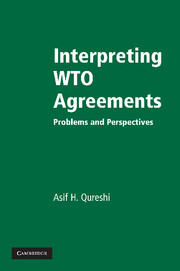Book contents
- Frontmatter
- Contents
- Preface
- List of Abbreviations
- Introduction
- 1 Interpreting principles of treaty interpretation in the WTO
- 2 Interpreting institutional aspects of the WTO Agreements
- 3 The national dimension to interpretation in the framework of the WTO
- 4 Interpreting exceptions in the WTO Agreements
- 5 Interpreting the WTO Agreements for the development objective
- 6 ‘Interpreting’ in external concerns
- 7 Interpreting the agreements on trade remedies
- Conclusion
- Annexes
- Index
1 - Interpreting principles of treaty interpretation in the WTO
Published online by Cambridge University Press: 23 February 2010
- Frontmatter
- Contents
- Preface
- List of Abbreviations
- Introduction
- 1 Interpreting principles of treaty interpretation in the WTO
- 2 Interpreting institutional aspects of the WTO Agreements
- 3 The national dimension to interpretation in the framework of the WTO
- 4 Interpreting exceptions in the WTO Agreements
- 5 Interpreting the WTO Agreements for the development objective
- 6 ‘Interpreting’ in external concerns
- 7 Interpreting the agreements on trade remedies
- Conclusion
- Annexes
- Index
Summary
Introduction
The jurisprudence of the World Trade Organization (WTO) is replete with references to Articles 31–2 of the Vienna Convention (VC) on the Law of Treaties. This gospel for interpretation is often the startingpoint of judgments in the WTO. Its use in the WTO became established with the Appellate Body (AB) decision in the US–Gasoline case. wherein it was pointed out that the general rule of interpretation set out in Article 31 of the VC had
attained the status of a rule of customary or general international law. As such, it forms part of the ‘customary rules of interpretation of public international law’ which the Appellate Body has been directed, by Article 3(2) of the DSU [Understanding on Rules and Procedures Governing the Settlement of Disputes], to apply in seeking to clarify the provisions of the General Agreement and the other ‘covered agreements’ of the Marrakesh Agreement Establishing the World Trade Organization. … That direction reflects a measure of recognition that the General Agreement is not to be read in clinical isolation from public international law. (Footnotes omitted)
This statement is often religiously cited in other WTO cases. Indeed, in the same vein, Article 32 of the VC has also been acknowledged as having attained the status of a customary rule of interpretation of public international law. This equation of customary rules of interpretation of public international law in Article 3 (2) of the DSU with Articles 31–2 of the VC is founded ultimately on the need to ensure certainty and clarity in the process of interpretation of the WTO Agreements.
- Type
- Chapter
- Information
- Interpreting WTO AgreementsProblems and Perspectives, pp. 3 - 29Publisher: Cambridge University PressPrint publication year: 2006



